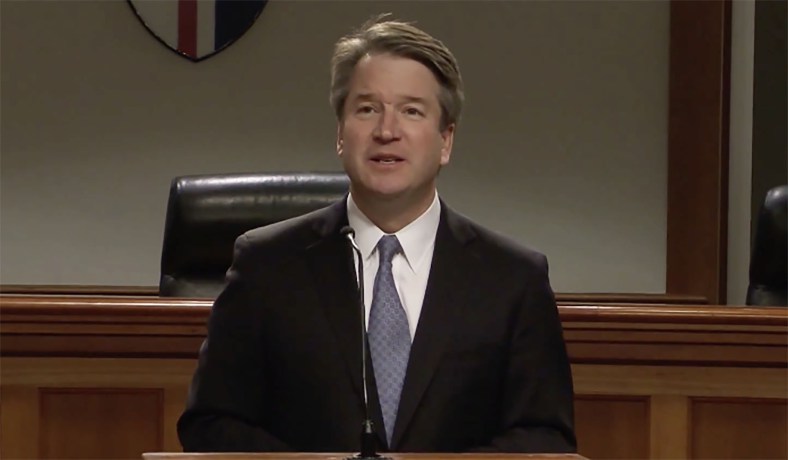Hon. Brett Kavanaugh
United States Court of Appeals for the District of Columbia Circuit (2006-Present)
This is the fourth in a series of posts on the free speech rulings of Judge Brett Kavanaugh. (Part I is here, part II is here, and part III is here.) Previous posts have focused on cases squarely raising claims related to political free speech and press rights. But Judge Kavanaugh has shown a willingness to protect speech rights in other contexts, including while interpreting the expansive Communications Act of 1934.
In contrast to campaign finance law, which sharply limits the Federal Election Commission’s discretion, the Communications Act and its amendments give the Federal Communications Commission (“FCC”) wide power to regulate wire and radio systems to promote equality and efficiency in communications. One hotly contested issue is whether the FCC may regulate Internet companies as “common carrier” utilities (like landline telephones) under the Communications Act – a debate commonly referred to as “Net Neutrality.”
In a pair of dissents, Judge Kavanaugh staked out the importance of protecting the freedom of speech, even for corporations.
United States Telecom Association v. FCC, 855 F.3d 381 (D.C. Cir. 2017) (en banc)
In this case, the parties challenged the FCC’s 2015 Open Internet Order. That rule imposed Net Neutrality on the Internet. A panel of three judges from the D.C. Circuit Court of Appeals upheld the FCC’s power to issue the Net Neutrality rule, and multiple parties sought en banc review by the full D.C. Circuit.
A majority of the court chose not to rehear the case en banc. 855 F.3d 381, 832. But Judge Kavanaugh dissented, stating unequivocally, “[t]he net neutrality rule is unlawful and must be vacated” for two reasons. Id. at 417.
First, Judge Kavanaugh believed that the Communications Act did not “supply clear congressional authorization for the FCC to impose common-carrier regulation on Internet service providers.” Id. at 418 (emphasis in original). The judge used the “major rules doctrine” as articulated by Justice Scalia. He would require “Congress to speak clearly if it wishes to assign to an agency decisions of vast economic and political significance.” Id. (collecting cases, internal quotation marks omitted). Such requirements would “help[] preserve the separation of powers and operate[] as a vital check on expansive and aggressive assertions of executive authority.” Id.
Second, Judge Kavanaugh argued in the alternative that Net Neutrality “violates the First Amendment to the U.S. Constitution” because it “restrict[s] the editorial discretion of Internet service providers.” Id. While the Constitution grants “Congress substantial power to regulate interstate commerce,” when it comes to “the press and other editors and speakers in the communications marketplace,” the “First Amendment demands the Government employ a more ‘laissez-faire regime.’” Id. at 427 (citation omitted).
Judge Kavanaugh looked to the time of the Founding. He noted that the First Amendment was designed to protect “the editorial discretion of the many publishers, newspapers, and pamphleteers who produced and supplied written communications to the citizens of the United States.” Id. If “[t]he Federal Government could not compel book publishers to accept and promote books on equal terms or to publish books from authors with different perspectives,” and cable companies had similar editorial control over which channels they provided, then the same rules should apply to the Internet. Id. (discussing Turner Broadcasting System, Inc. v. FCC, 520 U.S. 180 (1997) (“Turner Broadcasting II”)).
Applying intermediate scrutiny to the rule, Judge Kavanaugh argued Net Neutrality does not survive such review. “[T]he FCC has not shown that Internet service providers possess market power in a relevant geographic market.” Id. at 433.[1]
That is because the rule violates “bedrock Buckley principle… one of the most important sentences in First Amendment history: The ‘concept that government may restrict the speech of some elements of our society in order to enhance the relative voice of others is wholly foreign to the First Amendment.’” Id. at 432 (quoting Buckley v. Valeo, 424 U.S. 1, 48-49 (1976) (per curiam)). Otherwise, the government could “regulate the editorial decisions of Facebook and Google, of MSNBC and Fox, of NYTimes.com and WSJ.com, of YouTube and Twitter.” Id. at 433.
Cablevision Systems Corp. v. FCC, 597 F.3d 1306 (D.C. Cir. 2010)
Cablevision asked whether the Communications Act allowed the FCC to prohibit exclusive contracts between cable companies and affiliated networks. 597 F.3d 1306, 1307-08. The majority of the panel held that the FCC could prohibit such contracts. Id. at 1315. But Judge Kavanaugh filed a spirited dissent.
Judge Kavanaugh sees the First Amendment as “straightforward and expansive,” and “it applies to modern means of communication as it did to the publishers, pamphleteers, and newspapers of the founding era.” Id. at 1315. The “Government may adopt a content-neutral regulation interfering with” speech platforms’ “First Amendment rights only if the regulation furthers an ‘important’ or ‘substantial’ government interest and the restriction on speech is ‘no greater than is essential to the furtherance of that interest.’” Id. (quoting Turner Broadcasting System, Inc. v. FCC, 512 U.S. 622, 662 (1994) (“Turner Broadcasting I”)).
Judge Kavanaugh noted that “forced-sharing mandate[s] pose[] a First Amendment issue because the right of a First Amendment-protected editor or speaker not to speak and associate” is just as important as the right of freedom of speech and association. Id.
For Judge Kavanaugh, First Amendment scrutiny “is still tough scrutiny, not a judicial rubber stamp.” Id. at 1323. Ultimately, the judge sees that the First Amendment “greatly limits the Government’s ability to interfere with speech in communication markets – as compared to the Government’s power to regulate, for example, energy, labor relations, the environment, or securities transactions.” Id. at 1328. While “some contend that the greatest threat to free speech today comes from private entities not from the Government. Whatever the merits of that argument as a philosophical matter, the First Amendment is a restriction on governmental power.” Id. (emphasis in original).
Judge Kavanaugh ended his dissent with these important words: “If by our best lights we conclude that a law or regulation violates the First Amendment as the Amendment has been interpreted by the Supreme Court, then it is our duty to so rule, notwithstanding the good intentions of the political branches or the legitimacy of the policy goal.” Id. at 1328-29.
Conclusion
The Institute agrees that the First Amendment is designed to keep the hands of the government out of the editorial decisions of speakers. That includes those who speak on the Internet. Though he wrote in dissent, Judge Kavanaugh’s view of the First Amendment as a shield from bureaucratic meddling is important to consider. The Internet’s success comes from the freedom it enjoyed in allowing those with modest means a voice to reach many.
Judge Kavanaugh appears to see the importance of the freedom of speech both in what one says and what one chooses not to say. Likewise for freedom of association. Both views – the right to speak and the right to not be compelled to speak – are at the heart of the First Amendment.
[1] However, if the government could show that an Internet service provider had “market power” – then perhaps it may regulate the service provider as a utility. Id. at 435. But absent such a showing, “the Government must keep its hands off the editorial decisions of Internet service providers.” Id.














